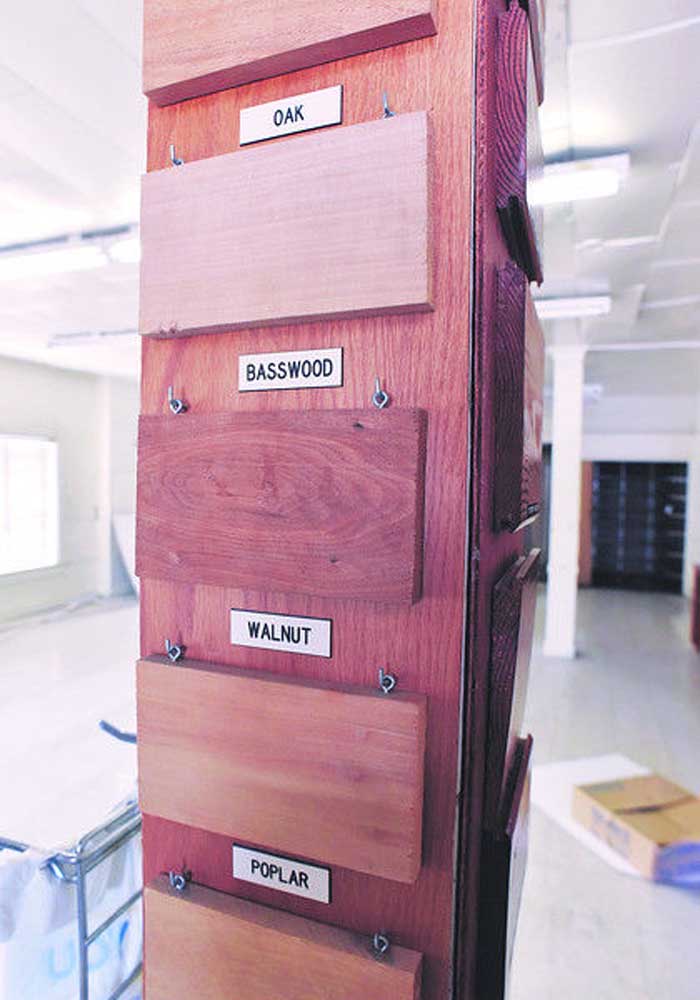Smith County moves to purchase Gulf State Lumber property, plans department moves
Published 7:18 pm Tuesday, April 5, 2016

- Wood samples still hang on a post near the cash register on Tuedsay at Gulf States Lumber in Tyler. The samples were left in place when the business closed in 2014 and Smith County commissioners are eyeing the facility on Line Street for conversion to long-term records storage and offices for the county Facilities Services department. Andrew D. Brosig/Tyler Morning Telegraph via AP)
A campus that once housed everything needed for construction and home repair will now be the hub for Smith County maintenance crews and records storage.
On Tuesday, the Smith County Commissioners Court unanimously approved moving forward with the purchase of the old Gulf State Lumber Co. property, 302 E. Line St. in downtown Tyler.
The property and all buildings on site will be purchased for $415,000. The paperwork is anticipated to be complete in October, but complete renovations will come as the county can pay for them with cash.
The company was once a staple for home improvement weekend warriors and building contractors, but it closed in 2014 after 85 years in business.
S.A. Lindsey started Gulf State Lumber Co. in 1928. He also owned Peoples National Bank downtown and, in 1905, started Gulf State Telephone Co., which later sold to Sprint.
The face and front office of the business will now be the central hub for the county Facilities Services Department.
Storage rooms with deep shelves now will hold buckets of nails and screws, lumber, old doors, air filters and other items used in county facility maintenance.
The facilities department moved from another historic building – the Crescent Laundry Complex, 312-B E. Ferguson St. The building once housed dry cleaning equipment.
The county is renovating a building in that complex for animal control. The former facilities office could be used as part of the animal control facility or as support offices.
“We moved over here in a real quick fashion, so we could finish building the animal control facility,” Christian said.
The move will give the department more space.
“It’s a chronic problem – you never have enough room,” Christian said. “The back part of a building was used as a storage stock room and carpenter shop, which is nice for us. We never had room before.”
Two other buildings on the property are planned to be used for the Records Services Department. The large metal buildings have concrete floors and are connected together by a covered driveway.
Inside, one of the buildings has large, metal shelves that can be used to store record boxes, and the storage can be extended upward, as the buildings have ceilings higher than 20 feet.
The county’s oldest records currently are stored in the basement of the Cotton Belt Building, 1715 W. Front St., beneath the area where drivers get their auto registrations renewed.
The department has historical records dating back to 1846, when Smith County was formed. The area where records sit has a flooding risk.
In June 2015, a crushed sewage drain line under the slab of the building threatened historical documents kept there. A 100-foot trench was dug under the building’s foundation to unearth clay sewage pipes that were installed in 1954.
LEASE-PURCHASE AGREEMENT
In February 2015, Smith County Commissioners approved a 19-month lease agreement to utilize the old Gulf State Lumberyard. Gulf State Lumber President Sam Wolf and County Judge Joel Baker signed a contract on March 13, 2015.
The lease calls for four payments with a total cost of $415,000. It has the option to purchase the land for the same price – similar to a rent-to-own contract.
The lease is a “triple net lease,” in which the county pays for rent, utilities, taxes, insurance premiums and repair costs. The landlord is charged with repairing the foundation of the buildings as well as any wall or roof improvements.
The lease is to be paid in four payments. Two payments were to be paid in 2015: $50,000 in April and $182,400 in October. In October, another $182,400 payment will be made, plus a $200 final payment, according to the lease agreement.
The agreement was approved after an executive session Feb. 10, 2015.
Baker made the motion to “approve the lease agreement as presented.” It was seconded by Commissioner JoAnn Hampton and unanimously approved by the court.
Tuesday’s meeting was the first public discussion on the property’s purchase and its intended use.
Twitter: @TMTFaith






